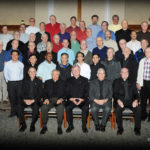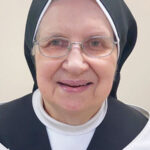By Deacon Steve Barton
The structure of poverty is a social sin and a true moral issue in our world with devastating impacts on human lives. So we should ask, “How is the sin of poverty defeated?” As with all sin, the answer lies in the mercy and grace of God. We know that “where sin increased, grace overflowed all the more” (Romans 5:20 NABR).

In the case of poverty, social sin operates through false shared beliefs. Through God’s grace, the truth about poverty can inform the behaviors in groups so that they work to remove barriers to escaping poverty and work to eliminate poverty. Truth can influence public policy, social programs, legislation and funding to help people overcome barriers through programs such as job training and workforce development.
Private funding can also help alleviate poverty by supporting programs such as food pantries, shelters and affordable housing. These near-term support efforts can promote understanding of the long-term causes of poverty through encounters with people in poverty.
More than 40 million people in the U.S. live at the poverty level, about 13 percent of the U.S. population, according to the U.S. Census Bureau’s most recent figures (2016). This number has grown from 30 million people in 1980 and has not dropped below that number in the last 36 years. The poverty rate has stayed between 11 percent and 15 percent of the population each of those years, rising to the highest level in the recession that began in December 2007.
For those 40 million people, here’s what poverty means: a person earns $12,140 a year or less; $16,460 for two people according to the Department of Health and Human Services. For one person, with an income of about $1,000 per month, that’s less than fulltime employment at minimum wage. Housing alone takes more than half of that, with the average rent for a one-bedroom apartment in Davenport at $600 a month. That leaves $100 per week for the essentials of food, clothing, child care, public transportation and utilities — and little or no money for a vehicle and health care.
Public assistance such as the Supplemental Nutrition Assistance Program (SNAP, formerly food stamps) helps fill the gap, somewhat. The maximum food aid in Iowa is about $200 a month for one person with no income; a person with income — even at poverty level — would receive less than that. Unforeseen expenses, such as car repair or unexpected illness, can be devastating.
These truths about poverty, coupled with the grace that operates through the church in the sacraments, can help overcome the social sin of poverty. Grace flowing through the sacraments unites us with those who suffer, invites us to take action to alleviate that suffering, and in turn liberates us from the bonds of sin. “The fruit of sacramental life is both personal and ecclesial … for the Church, it is an increase in charity and in her mission of witness,” the Catechism of the Catholic Church states.
Eucharistic life is about living the Mystery in our own lives, taking responsibility for others, sharing their concerns and bearing their burdens, Msgr. Kevin Irwin, author of “Models of the Eucharist,” observes.
This aspect of sacramental grace operates in a social context, not just individually. The principle of concern and support for others inherently involves social groups and institutions. “The movement of (social) grace is toward the construction of social institutions of grace in every sphere of human life,” says Roger Haight, author of “Sin & Grace in Systematic Theology: Roman Catholic Perspectives.”
Grace in eucharistic living draws groups and institutions to show solidarity by sharing in the sufferings of the poor and by working to alleviate and eliminate poverty.
They publicize the true causes of poverty; dispel myths and move institutions and organizations toward eliminating poverty. They give people in poverty a voice by advocating for social justice in public policy, legislation and in programs that provide real opportunities to succeed. Support of social actions such as food pantries, shelters and affordable housing buttresses the efforts.
We see the action of grace sacramentally and socially in the three aspects of liturgy: Word (faith), worship (prayer) and charity (living). Homilies bridge the Liturgy of the Word and the Liturgy of the Eucharist, compelling us to live the faith and the paschal love of Christ. In prayer, we petition the Lord on behalf of others, such as people in poverty. The sign of peace signifies our solidarity in Christian relationship. As brothers and sisters in Christ, we receive the body and blood of Christ for living the paschal mystery together. At the end of Mass, we are dismissed to go serve the Lord by living the Gospel. Our service to others outside the Mass is to be lived especially for the poor and marginalized in our parishes, dioceses and worldwide community.
Deacons are charged with this three-fold ministry of service in Word (faith), worship (prayer) and charity (living). The deacon’s role in the Mass relates to his diaconal service outside of Mass. As heralds of the Gospel, deacons are called to evangelize by proclaiming the Word and by witnessing Christ in the world. Deacons can address social sins such as poverty by promoting recognition of the true causes of poverty, dispelling myths and encouraging social behaviors that work toward eliminating poverty. Deacons can give the poor a voice by advocating for social justice in public policy and for programs that provide real opportunities for people to escape the bonds of poverty. They support social action by leading charitable works such as food pantries, homeless outreach, ministry to the incarcerated and welcome to immigrants and refugees.
Grace can defeat the social sin of poverty when we live as witnesses of the Gospel in our words and works of charity to stand with, give voice to and help people living in poverty.
(Deacon Steve Barton is a deacon at Holy Family Parish in Davenport.)











